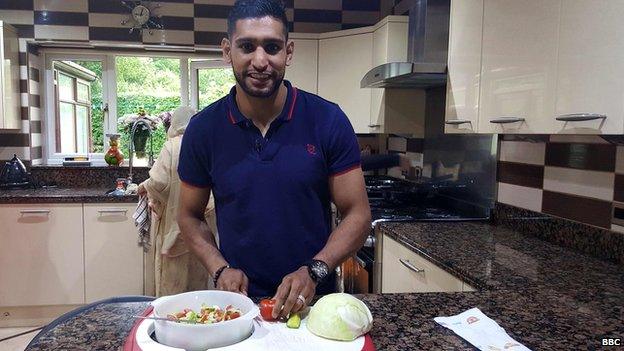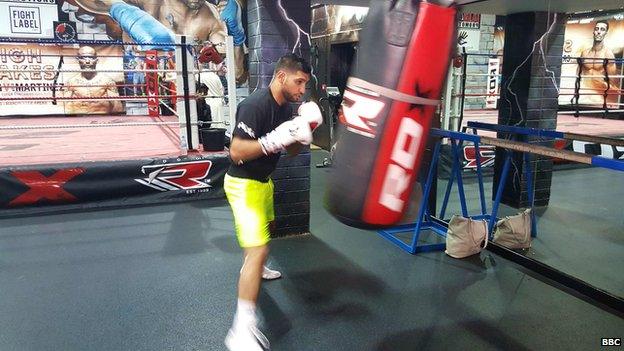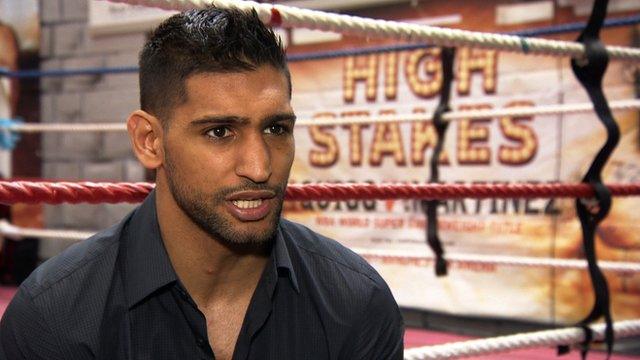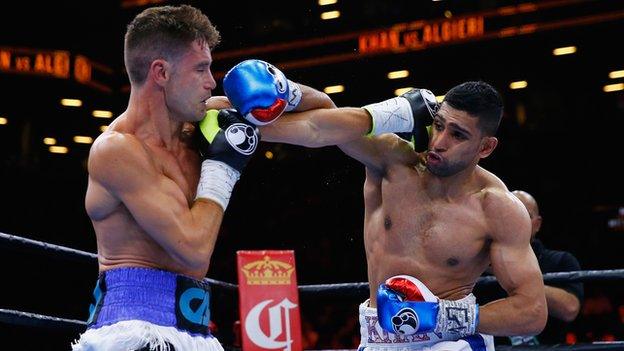Amir Khan: Fasting during Ramadan a worthwhile 'sacrifice'
- Published
Boxer Amir Khan spoke about fasting and training to BBC North West Tonight
With Ramadan coinciding with the hot weather - not to mention the longest possible hours of daylight - fasting Muslims in the UK are certainly being challenged at the moment. But how do elite sportsmen like Amir Khan cope with training in the absence of food and water between dawn and dusk?
The Bolton boxer insists fasting will not adversely affect his chances if - as has been widely speculated - he faces undefeated triple welterweight world champion Floyd Mayweather in September.
Khan insists on training throughout Ramadan - 30 consecutive days of fasting for 17 hours - while eating and drinking only at night.
"The training has changed big time", the 28-year-old acknowledges. "After fasting all day I eat late in the evening, go to mosque for my prayers and then hit the gym at midnight to train for about an hour.
"It's extremely tough but the motivation for me is that my opponents are sleeping whilst Amir Khan is training. It's not really something a sportsman should be doing but that's the sacrifices you have to make when you're a Muslim."

What is Ramadan?
About three million Muslims in the UK observe Ramadan - the holiest month in Islam - by fasting from sunrise to sunset
As one of the five pillars of Islam, fasting is obligatory for all healthy Muslims - a test of patience and endurance whilst refraining from eating and drinking and sexual activity
Since Muslims follow the lunar calendar, its timing each year varies wildly
This year's Ramadan means those who fast go without food or water for up to 17 hours a day
As well as fasting, Muslims will also try to give up bad habits, attend extra prayers and give consideration to the poor during Ramadan
Whilst fasting, daily life and normal routine continues - in fact it is encouraged
Muslims will celebrate the festival of Eid al-Fitr which marks the end of Ramadan on 17 or 18 July

Khan, who shot to fame as a 17-year-old by winning a silver medal, external at the 2004 Olympics, explains why he is confident of being in tip-top condition in time for what would be the biggest fight of his professional career.
"Ramadan ends on 17 or 18 July - that gives me enough time to finish Ramadan and then go into hard training. I'm very confident, I think that fight could definitely happen - I'm just waiting for that phone call.
"If I get the big fight with Floyd Mayweather, I'll be more than ready for it. Ramadan is not going to make a difference!"
Boxing trainer Adam Booth looked after former British and Commonwealth heavyweight champion Danny Williams, who was also a devout Muslim.
"Danny used to fast during the month of Ramadan and we would change the cycle for eating, sleeping and training," he said. "It's definitely 100% possible for Amir Khan to fast during Ramadan and be ready to face Mayweather in the Autumn."
Former light welterweight world champion Khan usually eats five meals a day, but during Ramadan he reduces that to only two.
"I miss my morning cup of tea and my desserts when I'm fasting," he laughs, before explaining what it's like when he can finally tuck in.
"Sometimes there's so much food in front of you and you think 'I just want to get stuck in' but that's the challenge - you have to make sure you eat healthily but it's very hard - I sometimes like to slide away and have a kebab or a samosa - it's not easy!
"I'm a normal guy at the end of the day - but I make up for it when I go back into the training camp."

Amir Khan admits finding it hard to eat healthily during Ramadan
Although he is now a married man and a father, Khan still cannot resist his mum's cooking.
"Her food is amazing - I call it 'happy food' because it makes me so happy, it's the first thing I crave - training camp food is so plain and bland, but when I'm at home mum makes sure she feeds me lots of meaty curries… that's why I put on so much weight between training.
"I like to add bits to my mum's cooking too - she doesn't like that - so I have to explain the health benefits of why I'm adding that extra bit of ginger, for example."


Amir Khan trains during the middle of the night during Ramadan
Tale of the tape
In 2004, 17-year-old Khan tried to become the youngest Olympic champion since Floyd Patterson in 1952 when he competed for Great Britain in Athens
The Bolton teenager eventually had to settle for silver after being beaten in the final
He turned professional about a year later
Khan has had 34 professional fights, winning 31 (19 of them by knock-out) and losing three
Height: 5ft 8in (1.74m)
Fighting weight: 10st - 10st 7lb (63.5-67kg)

Rugby union sports nutritionist Matt Lovell believes fasting could prove beneficial to Khan.
"It can be done," he says. "Fasting can give you mental strength and power. I can't see Ramadan affecting Amir negatively - the six weeks between the end of Ramadan and Khan's potential big fight with Floyd Mayweather is enough time for him to be ready."
Khan started fasting when he was eight years old, and believes his faith goes glove-in-glove with his sport.
"When I go into the boxing ring, it's a very lonely place, when I go into the gym it's a very quiet place. I'm on my own training, but it's God that gives me the strength.
"My faith drives me, gives me that motivation and that push. I see a lot of people around the world, Muslims and non-Muslim who have a lot of belief in their faith. They're the people who get far in life - if you have belief you can definitely get far."
- Attribution
- Published2 June 2015

- Attribution
- Published30 May 2015
